Transistor – Review
by Adam Smith
|
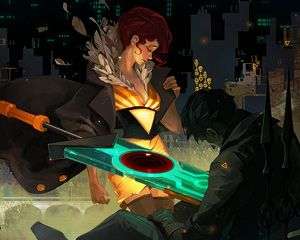 Transistor is the second release by Supergiant Games; their previous was Bastion in 2011, and the similarities between both are immediately noticeable. While both are RPGs that share an isometric perspective, they differ in their aesthetic. Where Bastion had a post-apocalyptic Arcadian theme, Transistor is a futuristic cyberpunk-without-the-punk dystopia for the player to explore. The art style is akin to if one of the Little Sisters from BioShock had taken Rapture’s first game design class, although I do like it more than I do Bastion’s – the difference being that both the game world and the enemies subscribe to it. While in Bastion the ‘squirts’ and ‘gas giants’ could easily have come from any RPG game, the enemies in Transistor look so robotic and processed that it lends, ironically, an almost organic nature to their development in the world.
Transistor is the second release by Supergiant Games; their previous was Bastion in 2011, and the similarities between both are immediately noticeable. While both are RPGs that share an isometric perspective, they differ in their aesthetic. Where Bastion had a post-apocalyptic Arcadian theme, Transistor is a futuristic cyberpunk-without-the-punk dystopia for the player to explore. The art style is akin to if one of the Little Sisters from BioShock had taken Rapture’s first game design class, although I do like it more than I do Bastion’s – the difference being that both the game world and the enemies subscribe to it. While in Bastion the ‘squirts’ and ‘gas giants’ could easily have come from any RPG game, the enemies in Transistor look so robotic and processed that it lends, ironically, an almost organic nature to their development in the world.
That said, Transistor’s world and narrative is a confusing one. The player’s character, called Red, starts in the middle of the ‘Cloudbank’, a futuristic city run by a dictatorial ‘Camerata’ – a shadowy cabal of individuals who run the city. This Camerata has taken Red’s voice for their own purposes, and so naturally there is a mystery to be solved and a load of antagonistic robots between you and the truth, which need to be destroyed. To assist you in this purpose is a talking sword called the ‘Transistor’ which the character finds embedded in the body of a dead man. Somehow, this man’s soul has been uploaded into this giant USB-style blade, and so provides the voiceover for the game and some narrative exposition, similar to the relationship between The Kid and Rucks in Bastion.
As well as having a memory stick as a weapon, the player also has access to ‘Functions’, which are various attacks that the player can ‘install’ into four weapon slots. Basic attacks are varied, but do not stray too far from the default short-range attack, long-range attack, and grenade; although there are also moves that allow for brief hypnotism of enemies, and another that generates minions to attack enemies for you. Nothing particularly game changing, but with enough variation that the player shouldn’t get bored with their battle strategy and is indeed encouraged to change their forms of attack.
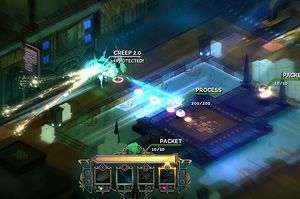 An inspired aesthetic decision was to add brackets to the end of every attack name, making each one appear like the player is running a line of code to battle. In a world made entirely to look like a living motherboard, this is a nice touch. The battle style is a mix between traditional real-time strategy, and a time-stopping spacebar move that allows the player to carry out a series of attacks in quick succession. It feels very natural, allowing a ‘fuck this’ escape mechanic to the game if the enemies get too overpowering and the player gets forced into a tight corner, but also allows for complex battle plans that couldn’t be achieved real-time, without it feeling like they are overpowered.
An inspired aesthetic decision was to add brackets to the end of every attack name, making each one appear like the player is running a line of code to battle. In a world made entirely to look like a living motherboard, this is a nice touch. The battle style is a mix between traditional real-time strategy, and a time-stopping spacebar move that allows the player to carry out a series of attacks in quick succession. It feels very natural, allowing a ‘fuck this’ escape mechanic to the game if the enemies get too overpowering and the player gets forced into a tight corner, but also allows for complex battle plans that couldn’t be achieved real-time, without it feeling like they are overpowered.
What Transistor does do differently in its battle mechanics is that each ‘Function’ the player gains is not simply another weapon, but also has secondary abilities allowing it to be stacked to another Function. This means that when the player unlocks a new move that doesn’t quite gel with their battle strategy, they can simply add it to another as a power up and continue playing. My personal favourite was combing the ‘Help ()’ attack, which summoned a robotic dog to assist you in your plight, with the secondary ability of ‘Spark ()’ which doubled the functionality of a move – meaning two robotic dogs for the price of one.
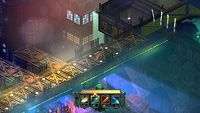 |
 |
 |
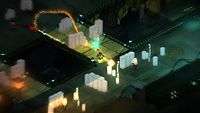 |
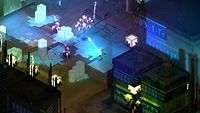 |
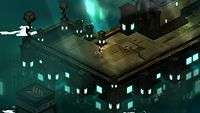 |
There are also ‘Limiters’, which increase the player’s experience points at the expense of boosting the enemies’ power – similar to the Idols in Bastion – however, there didn’t seem to be any reason to use them, and unless you’re feeling a particular desire to see the level-up animation and unlock every Function, they’re not really necessary. What they are necessary for, however, is gaining backstory; this is where the encouragement to change your battle strategy comes in.
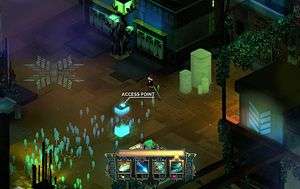 Each Function is actually the soul of someone that lived in Cloudbank – the stealth move is the soul of a magician, for example – and the more secondary abilities that are attached to each Function, the more exposition is unlocked. This is a brilliant idea but it doesn’t quite work in the game. When a player has spent time honing a battle strategy that suits them, they are usually loathe to give that up. I certainly didn’t want to swap my particular distance-based move set, which relied on manipulating minions and long-range attacks, for one that I wasn’t really very good at and which involved close combat.
Each Function is actually the soul of someone that lived in Cloudbank – the stealth move is the soul of a magician, for example – and the more secondary abilities that are attached to each Function, the more exposition is unlocked. This is a brilliant idea but it doesn’t quite work in the game. When a player has spent time honing a battle strategy that suits them, they are usually loathe to give that up. I certainly didn’t want to swap my particular distance-based move set, which relied on manipulating minions and long-range attacks, for one that I wasn’t really very good at and which involved close combat.
It helps that whenever the player loses their health they forfeit one of their functions rather than have the game end, so one could easily get used to using another attack, but the Functions are restored so quickly that it barely affects the player’s overarching strategy. Bastion’s omnipotent narrator constantly gave smooth information, with there being few items in-game that gave backstory, and that was a much nicer accompaniment than Transistor’s as it didn’t interfere with gameplay. It’s still a great idea, but needed smoother integration. Also, in contrast to Bastion’s non-boss-fight, which was a perfect finale to the games plot, the final boss of Transistor wasn’t the big spectacle that I was hoping for.
That said, I still love Transistor and will be going back to play it again so I can learn the intricacies of the story. I’m not done with the Camerata, I’m not done with Red, and I’m still hardwired in to the Cloudbank’s components. Oh, and if anyone feels like making a custom memory stick in the shape of Transistor, I will give them all of my money.
Pros- Great aesthetic
- Great battle mechanic
- Narrative and exposition are difficult to explore
- Final Boss is disappointingly easy
Amidst a rather confusing plot line, Transistor has a brilliant combat system and presents it absolutely gorgeously with a soundtrack which - while not as memorable as Bastion - is still powerful. You'll be loathe to find a game with a better talking sword or cooler narrative presentation of a woman on the run from a mysterious government.
Last five articles by Adam Smith
- Best of 2014 - Comedy in Videogames
- Fates Forever - Review
- Lifeless Planet - Review
- Transistor - Review
- Comedy in Video Games















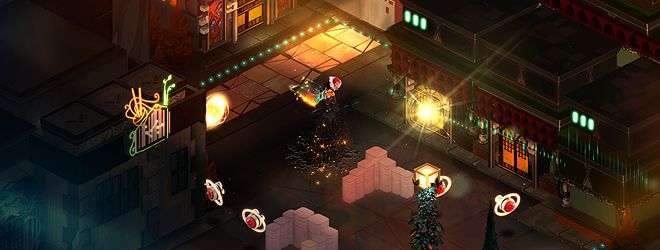
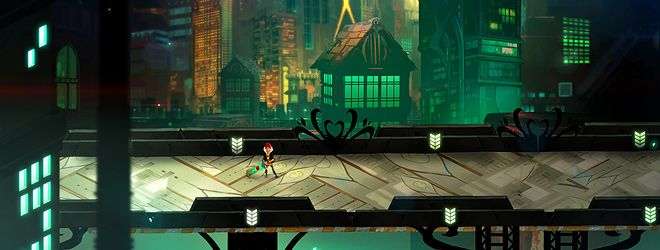






Nice review.
I’m quite tempted by this game now. The combat sounds interesting from how you’ve described it.